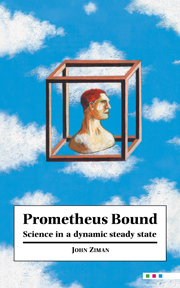Book contents
- Frontmatter
- Contents
- Preface
- 1 What is happening to science?
- 2 Scientific and technological progress
- 3 Sophistication and collectivization
- 4 Transition to a new regime
- 5 Allocation of resources
- 6 Institutional responses to change
- 7 Scientific careers
- 8 Science without frontiers
- 9 Steering through the buzzword blizzard
- Further reading
- Index
3 - Sophistication and collectivization
Published online by Cambridge University Press: 05 August 2012
- Frontmatter
- Contents
- Preface
- 1 What is happening to science?
- 2 Scientific and technological progress
- 3 Sophistication and collectivization
- 4 Transition to a new regime
- 5 Allocation of resources
- 6 Institutional responses to change
- 7 Scientific careers
- 8 Science without frontiers
- 9 Steering through the buzzword blizzard
- Further reading
- Index
Summary
When the artificial bird had been wound up, it could sing one of the tunes that the real nightingale sang. The Emperor's daughter was delighted.
Instrumental sophistication
Scientific research has always been a highly technical activity. Scientists have always employed the most advanced technologies available to them. The scientific revolutions of the seventeenth century were only made possible by such recent inventions as the airpump, the microscope and the telescope. It is simply not true that the best research always used to be done with ramshackle apparatus consisting of bits of glass tubing held together with sealing wax and string. A new piece of equipment often has to be improvised or specially designed for a novel experiment, but scientific instruments in general have always been at the very forefront of the state of their art. Throughout history, major scientific discoveries can be traced back to the use of new or improved technological capabilities – a more refined optical glass, more accurate machine tools, purer chemical compounds, better defined breeding stock – many of which had been developed outside the research world.
The striking feature of our own times is the extent to which scientific advances fuel general technological progress. But general technological progress, in its turn, fuels the development of more powerful techniques of research, thus providing the means for further scientific advances. This cyclic process within the science/technology complex is not merely self-sustaining: it has begun to spiral wildly outwards in scope and scale.
Information
- Type
- Chapter
- Information
- Prometheus Bound , pp. 43 - 66Publisher: Cambridge University PressPrint publication year: 1994
